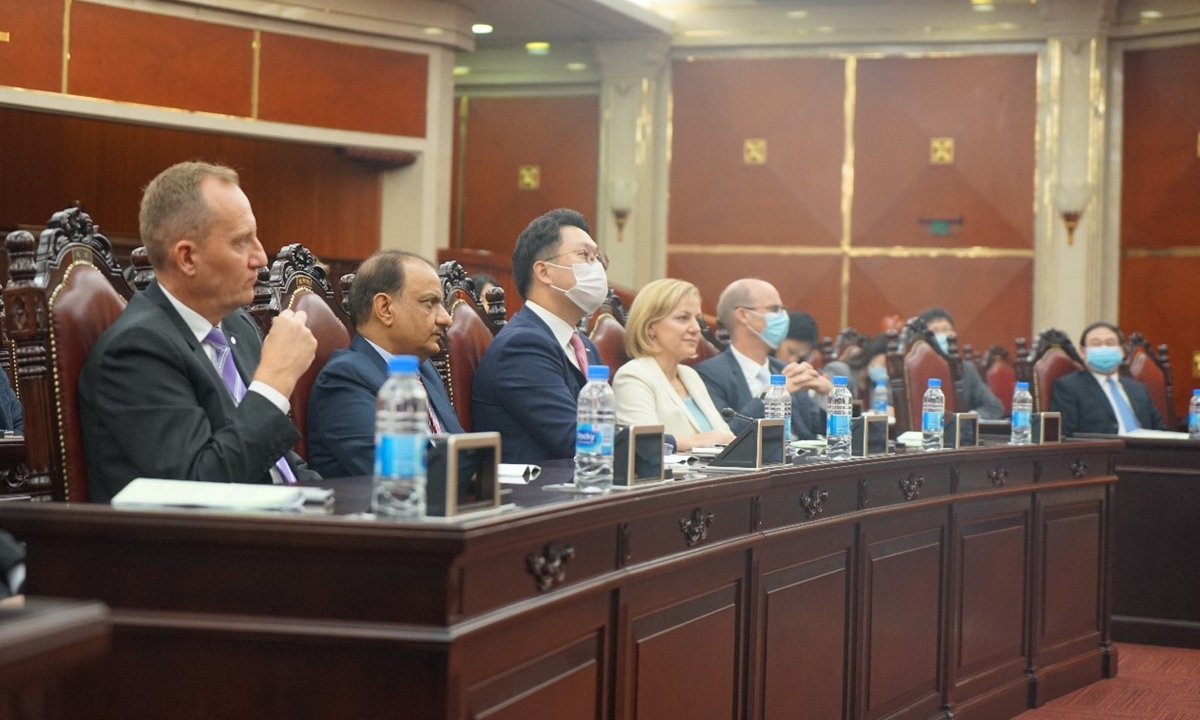Foreigners introduced to Shanghai's local legislature to better understand China's 'whole-process democracy'

Representatives from multinational companies and universities on Thursday listened to the introduction of the basic legislative procedure in Shanghai. Photo: Global Times
Over 20 representatives from multinational companies and universities visited Shanghai's legislative body on Thursday to have a look at the basic legislative procedure and better understand China's "whole-process democracy."
From the people and for the people, China's "whole-process democracy" reflects the wide participation of common people, which places emphasis on "listening to people and focus on people's livelihood," Chen Jing, Vice Chairman of the Standing Committee of Shanghai Municipal People's Congress (SMPC) and President of the Shanghai People's Association for Friendship with Foreign Countries, said during the opening speech at the event.
Chen mentioned as an example the legislative process for the waste management law. In 2018, the formulation of the Regulations on the Administration of Domestic Waste in Shanghai was officially put on the agenda. The SMPC urban construction and environmental protection committee conducted field research in 20 residential communities and 10 enterprises, covering over 10 districts, in a public consultation with over 2,000 deputies and 14,000 residents.
During the process, people's voices can be heard and their suggestions can be adopted. From 2015, a total of 25 grass-roots communities for legislative matters have been established in Shanghai. They submitted over 6,500 pieces of legislative recommendations, with over 530 of them adopted in national or local laws and regulations.
Nicolas Poirot, President and CEO of Air Liquide China, a multinational company supplying industrial gases and services, regarded the event as a good opportunity to better understand China's legislative system at the level of Shanghai municipality.
After the introduction on the work of the legislative system in China, Poirot also reflected on the laws on pandemic prevention and the waste management law. "It was interesting as it did not take months or weeks to approve urgent laws on COVID-19 prevention because the legislative power is here," Poirot told the Global Times on Thursday.
Due to the sudden COVID-19 outbreak at the beginning of 2020, the Standing Committee of the Shanghai Municipal People's Congress voted to adopt an urgent legislation on February 7, 2020 to "make every effort to prevent and control the current COVID-19 pandemic," which came into effect on that day. It was the first local regulation for epidemic prevention and control in China.
The example of the legislative process on the waste management law also impressed Rajnish Sharma, head of delivery and operations at Infosys China. The whole process of "taking feedback from citizens and then doing changes is really interesting," Sharma told the Global Times on Thursday.
Karolina Horoszczak, Communications and Public Affairs Vice President from IKEA (China) Investment Co, was reminded by the legislative examples about how decisions are taken and implemented immediately. "This is a fantastic opportunity to listen and think about it. What does it mean for our business? Can we take our decisions so much faster?" she told the Global Times on Thursday.
When talking about his own experience living in Shanghai, Poirot said that at his home, in Jinqiao Biyun community of Pudong New Area, a good job was done to let residents get involved in civic topics even if they are foreigners. "It is easier for us in such a big city to feel a local connection," Poirot said, adding that they also shared topics like travel, gardening, cooking and education, so "you feel part of the community."
During the discussion panel, Gao Deyi, Chairperson of the Office of the Foreign Affairs Committee of the SMPC said that, from the perspective of the local congress, the primary task is to improve the local legislative process to help achieving the goal of common prosperity.



